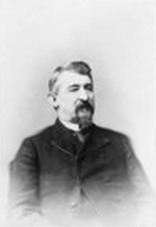Samuel W. Peel facts for kids
Quick facts for kids
Samuel W. Peel
|
|
|---|---|
 |
|
| 4th judicial circuit of Arkansas | |
| In office 1873-1876 |
|
| U.S. House of Representatives from Arkansas's 4th congressional district | |
| In office March 4, 1883 – March 3, 1885 |
|
| Preceded by | Thomas M. Gunter |
| Succeeded by | John H. Rogers |
| U.S. House of Representatives from Arkansas's 5th congressional district | |
| In office March 4, 1885 - March 3, 1893 |
|
| Preceded by | district created |
| Succeeded by | Hugh A. Dinsmore |
| Personal details | |
| Born | September 13, 1831 Batesville, Arkansas |
| Died | December 18, 1924 (aged 93) Bentonville, Arkansas |
| Political party | Democrat |
| Spouse | Mary Emaline Berry (January 30, 1853) |
| Children | 9 |
Samuel West Peel (born September 13, 1831 – died December 18, 1924) was an important person from Arkansas. He was a lawyer, a soldier in the Confederate Army, and he served in the United States House of Representatives. This means he helped make laws for the country.
Contents
Samuel West Peel's Early Life
Growing Up in Arkansas
Samuel W. Peel was born close to Batesville, Arkansas. His parents were John Wilson and Elizabeth West Peel. When Samuel was only four years old, his mother passed away. He then went to live with his grandparents.
Samuel went to the local public schools. As a teenager, he worked in his father's store. He also helped his father as a deputy court clerk. On January 30, 1853, he married Mary Emaline Berry. Together, they had nine children.
From 1858 to 1860, he worked as a clerk for the circuit court in Carroll County, Arkansas.
Serving in the War
When Arkansas left the United States in 1861, Samuel Peel joined the Confederate Army. He started as a private soldier. Later, he was chosen to be a major in the Third Regiment, Arkansas Infantry. He then became a colonel in the Fourth Regiment, Arkansas Infantry.
Peel fought in important battles like Wilson Creek and Prairie Grove. When the war ended, he left the army as a lieutenant colonel.
Becoming a Lawyer
After the war, Samuel Peel returned home to Carrollton. He found that his house had been burned down. He decided to study law with his brother-in-law, Judge James Middleton Pittman.
In 1865, he became a lawyer and started his own law practice in Carrollton, Arkansas. In 1867, he moved to Bentonville, in Benton County. He continued to work as a lawyer there.
Samuel Peel's Political Journey
Serving Arkansas as a Prosecutor
In 1873, the governor of Arkansas chose Samuel Peel for an important job. He became the prosecuting attorney for the fourth judicial circuit of Arkansas. A prosecuting attorney is a lawyer who works for the government. They try to prove that people who are accused of crimes are guilty. He held this job until 1876.
Working in Washington, D.C.
Samuel Peel was elected as a Democrat to the United States House of Representatives. He served for five terms, from March 4, 1883, to March 3, 1893. In the House of Representatives, he helped make laws for the entire country.
He was also the chairman of the Committee on Indian Affairs. This committee worked on issues related to Native American tribes. Tribal leaders often met with him at his home. After his time in Congress, he went back to being a lawyer in Bentonville, Arkansas. He also worked for the United States Court of Claims in Washington, D.C. until 1915.
Later Life and Legacy
Samuel West Peel passed away in Bentonville, Arkansas, on December 18, 1924. He was 93 years old. He was buried in the Bentonville cemetery. The city of Peel, Oregon was named after him.

